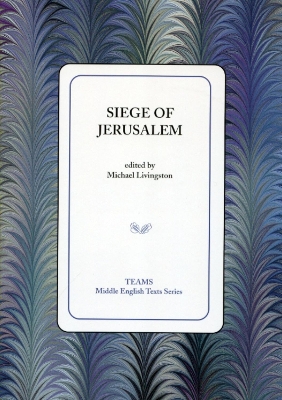
Briana @ Pages Unbound
Written on Jan 3, 2012
The war itself is depicted in full gory detail, such as one might have encountered in The Song of Roland. Bones break, brains fly, blood is everywhere, and a woman eats her own child because everyone in Jerusalem is starving. Not the usual descriptions one expects to find in a text so heavily focused on the religious, but very much with precedent and quite in the tradition of epic poems. Readers who are particularly queasy will probably not enjoy this book.
Another obvious concern for modern readers is the apparent anti-Semitism. According to the text, the Christians are right, and the Jews are wrong, and they willingly murdered God. The introduction notes the correlation between the violence of the crucifixion scene that begins the poem and the later violence enacted against Jerusalem in retribution. Obviously, a bit of historical perspective can help dampen any discomfort, as well as the knowledge that author probably had never met a Jew in England at the time. The Jews are in a way the unknown, faceless other, and another group could function just as well as the enemy. Also, both the author and the Romans offer the Jews a bit of mercy. Titus at one point calls them “fierce men and noble,” (871) and they are granted a lot of credit for inventing ingenious ways to defend their city. Does all this make the text fair? No. But its unfairness is part of what gives it historical value.
